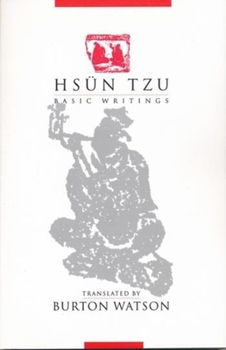Hsün Tzu: Basic Writings
Select Format
Select Condition 
Book Overview
Hs n Tzu set forth the most complete well-ordered philosophical system of his day. Although basically Confucian, he differed with Mencius, his famous predecessor in the Confucian school, by asserting that the original nature of man is evil. To counteract this evil, he advocated self-improvement, the pursuit of learning, the avoidance of obsession, and constant attention to ritual in all areas of life. With a translation by the noted scholar Burton Watson, includes an introduction to the philosopher in relation to Chinese history and thought. Readers familiar with Hs n Tzu's work will find that Watson's lucid translation breaths new life into this classic. For those not yet acquainted with Hs n Tzu, will reach a new generation who will find his ideas on government, language, and order and safety in society surprisingly close to the concerns of our own age.
Format:Paperback
Language:English
ISBN:0231106890
ISBN13:9780231106894
Release Date:April 1996
Publisher:Columbia University Press
Length:204 Pages
Weight:0.52 lbs.
Dimensions:0.6" x 5.2" x 8.0"
Grade Range:Postsecondary and higher
Customer Reviews
2 ratings
Confucian thought continued.
Published by Thriftbooks.com User , 20 years ago
Hsun Tzu followed Mencius, Confucius, and the other better-known names of Chinese philosphical history. He represents an interesting departure from them, though.He holds the same high regard for order, hierarchy, and ritual as the earlier Confucians. He combines it with some of the thinking from other schools, though. He flirts with Han Fei Tzu's Legalist pessimism about human nature. Hsun Tzu, however, asserts that proper behavior can be learned and taught. Deep understanding would be best, but even rote performance of one's proper roles and rituals are enough to save people from their innate flaws. He also takes on some of Chuang Tzu's mysticism. Hsun Tzu's "sage" seems almost to spread his upright influence just by standing among the lesser people, with a magical lack of causal relationship.It's clear that Hsun Tzu wrote as one among many different schools of thought. He spends a good bit of time explaining the errors of the competing philosophers, making it clear that his own thinking needed justification in that environment. He does, however, add a few notes of his own. For example, section 9 describes a king's duties. The king, through his deputies, is expected to regulate fishing, forestry, and other use of renewable resources. This is not meant to deprive anyone or to enrich the king artificially, but to keep the resources productive for the long term. How I wish that today's leaders would learn from the knowledge of 300BC.Hsun Tzu was not among the first rank of influential thinkers, but well up in the second rank. If you are building a library of Eastern classics, this certainly has a place on your shelf.
An interesting take on Confucianism
Published by Thriftbooks.com User , 23 years ago
While Hsun Tzu's writings are interesting in themselves, I found that a comparison of his work to both Confucius and Mencius provides much insight into the ways of human life. Particularly interesting is Hsun Tzu's take a human nature versus that of Confucius and Mencius. All in all this is an interesting read for anyone interested in philosophy, ancient Chinese culture or human interaction and life in general.






